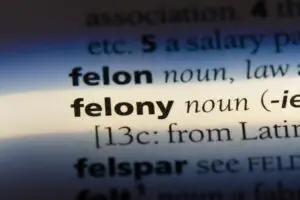
If you have been accused of or charged with committing a felony offense in the state of California, your entire future could be on the line. Understanding the charges against you and the potential impact of a felony conviction will be critical as you begin to prepare your defense strategy.
Your Los Angeles DUI lawyer can give you a better idea of the impact your charges will have on your life after having reviewed the specific details of your case. Here is more about what to expect from felony charges in the state of California.
Types of Felonies
Under California law, if you are charged at the felony level, there are multiple types of felonies you could be charged with. First are straight felonies. Straight felonies will only ever be charged or sentenced as felony crimes.
Straight felonies are considered the most serious type of crime under California law and will be considered strikes under California’s three-strike law. Some examples of criminal offenses that are considered straight felonies include:
- First-degree burglary
- Murder
- Rape
- Vehicular manslaughter or manslaughter with gross negligence
- Sale of a controlled substance
- Lewd acts with a child under 14
Felony sentences for these types of crimes can be extremely harsh. In some cases, like homicide, a lengthy prison sentence, life in prison, or even the death penalty may be possibilities.
Wobblers
Not all felonies are straight felonies. Some are considered wobbler felonies. A wobbler offense can be charged as a felony or a misdemeanor at the discretion of the state’s prosecuting attorney.
The prosecutor will consider whether there are any aggravating factors present, your criminal history, and the individual details of your case to determine whether you should be charged at the misdemeanor or felony level. Examples of wobblers include:
- Sexual battery
- Assault with a deadly weapon
- Vandalism
- Forgery
- Domestic violence
When Can a Felony Be Reduced to a Misdemeanor?
Only wobbler crimes can be reduced from a felony to a misdemeanor. Straight felonies are not eligible for such reductions.
California Penal Code 17(b) PC states that felonies can only be reduced to misdemeanors when an offender has been sentenced to and completed the terms of their felony probation and the offense is considered a wobbler felony.
Felony offenders can face severe penalties. If you are unsure whether your charges constitute a wobbler offense, be sure to reach out to your criminal defense lawyer for guidance and support. Your lawyer can fight to help you avoid jail time or reduce your penalties.
Consequences of a Felony Conviction in California
The consequences of a felony conviction can vary widely depending on the crime you were convicted of. In the majority of felony cases, fines can reach as high as $10,000, and the defendant will spend time in California state prison or county jail.
However, the amount of time someone convicted of a felony will spend in jail will be based upon whether their selling conviction carries a low, middle, or high term. For instance, someone convicted of felony first-degree burglary could expect to face two, four, or six years in California state prisons, depending on the specific details of their case.
In some cases, certain criminal offenses do not carry specific jail and prison terms. When this happens, it will be up to the judge to determine what the defendant’s sentence should be.
Generally, the judge will take into consideration:
- Whether there are any aggravating factors present
- What your criminal record is
- The individual details of your case
In murder cases, there is the possibility of the death penalty in California. If there are mitigating factors present, you might be more likely to be sentenced to the low or middle term. When you’re charged with severe crimes, it is important to seek legal representation immediately.
Probation for a Felony Conviction
At the judge’s discretion, if you are convicted of a felony offense, they can convert all or part of your sentence to formal probation.
Also commonly known as felony probation, you may be able to avoid spending jail time instead serving your sentence outside of police custody, but under the supervision of your probation officer. If you are placed on formal probation, there are specific terms you will need to meet.
Some of the conditions that might apply include:
- Completing community service
- Passing random drug or alcohol testing
- Attending regular meetings with your probation officer
- Paying restitution to any victims in your case
- Participation in mental health counseling or group therapy
- Random searches of your personal property
Generally, if you are convicted of a nonviolent felony, you could expect to spend up to two years on felony probation. However, in some cases, probation could be extended to three years if you were convicted of false impersonation, grand theft, embezzlement, or other crimes that do not specify a probation range.
What if You Violate the Terms of Your Probation?
If you violate the terms of your probation, the judge presiding over your case has the authority to revoke your probation and send you back to jail or prison to serve out the remaining term of your sentence.
You will also face any criminal charges related to your probation violation should they apply. It is also possible the judge could increase the length of your probation or impose more severe restrictions depending on the details of your case.
California Felony Expungements
If you are convicted of a felony in the state of California, you may be surprised to learn that you could be eligible for an expungement. This means your conviction may be sealed when certain parties run your background check.
If your record is expunged, you will also be able to truthfully answer “no” when you fill out applications that ask you whether you were previously convicted of a crime. However, if you were sent to state prison as part of the terms of your conviction, you may not be eligible for expungement.
To qualify for expungement in the state of California, you will need to be granted probation and have completed the terms of your probation. You must also not currently be in jail or on probation. You cannot be facing any current criminal charges or have been convicted of specific types of violent crimes or sex offenses.
Are There Any Defenses in a Felony DUI Case in California?
In felony DUI (Driving Under the Influence) cases, the stakes are high due to the severity of potential penalties, which may include significant fines, long-term license suspension, and substantial prison time.
Legal defenses in such cases are crucial and can vary based on the specifics of the incident, including the severity of any injuries caused, prior DUI convictions, and the level of intoxication. Here are some common legal defenses used in felony DUI cases:
- Improper Stop: This defense argues that the initial traffic stop by law enforcement was unlawful. Under the Fourth Amendment, police need a reasonable suspicion of a violation to stop a vehicle. If the stop was not justified, any evidence gathered during the stop, including breathalyzer results and field sobriety test results, might be excluded from the case.
- Inaccuracy of the Breathalyzer Test: Defense attorneys often question the accuracy and calibration of the breathalyzer device. Factors like improper usage by the officer, irregular maintenance, and external influences (such as certain medical conditions or diets affecting breath test results) can be grounds for contesting the reliability of the evidence.
- Rising Blood Alcohol Concentration: This defense posits that the defendant’s blood alcohol concentration (BAC) was below the legal limit while driving but increased between the time of the stop and the administration of the breathalyzer test. This can occur because alcohol takes time to absorb into the bloodstream.
- Field Sobriety Test Errors: The subjective nature of field sobriety tests can lead to false positives. Physical conditions, disabilities, or even nervousness can affect performance on these tests. Additionally, improper administration of these tests by the officer can lead to unreliable results.
- Medical Conditions: Certain medical conditions can mimic the symptoms of intoxication or affect breathalyzer results. Conditions like hypoglycemia, which can cause dizziness and slurred speech, or gastroesophageal reflux disease (GERD), which can elevate BAC readings, may be used as part of a defense strategy.
- Chain of Custody and Handling Errors: This defense examines the procedures followed when handling evidence. Mistakes in how blood samples are collected, stored, and analyzed can contaminate the sample or misrepresent the BAC level, leading to potential dismissal of this evidence.
Contact a Los Angeles DUI Lawyer to Learn More
When you are facing criminal charges at the felony level and do not know where to turn for help, get in touch with a knowledgeable Los Angeles DUI lawyer to discuss your defense strategy further. Our criminal defense attorneys can help you protect your rights.
Start exploring your legal options when you fill out our contact form or call our office to schedule your free initial consultation today.






